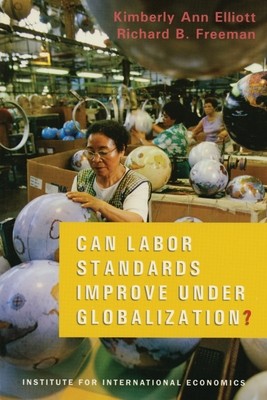
- We will send in 10–14 business days.
- Author: Kimberly Ann Elliott
- Publisher: Peterson Institute for International Economics
- ISBN-10: 0881323322
- ISBN-13: 9780881323320
- Format: 15.5 x 22.9 x 1 cm, minkšti viršeliai
- Language: English
- SAVE -10% with code: EXTRA
Can Labor Standards Improve Under Globalization? (e-book) (used book) | bookbook.eu
Reviews
Description
Protesters now routinely fill the streets when any large, formal meeting dealing with international economic issues takes place. They express concern about the potential social and environmental costs of globalization and want negotiators to address these issues in trade agreements and international organizations. In addition, the debate over whether and how to link labor standards to trade has led to an impasse in American trade policy for much of the past decade and has tied the hands of US trade negotiators. Proposals to "let the market do it" or "let the International Labor Organization (ILO) do it" abound, but it is less common to find any serious analysis of just how activists can galvanize consumers to demand that corporations raise labor standards in their global operations or how the ILO can become more effective.
In this study, Elliott and Freeman move beyond the debate on the relative merits and risks of a social clause in trade agreements and focus on practical approaches for improving labor standards in a more integrated global economy. The authors examine both what is being done in these areas and what more needs to be done to ensure that steady and tangible progress toward universal respect for core labor standards is made. While concluding that the ILO should have primary responsibility for labor standards, the book also suggests that the WTO should consider how to address egregious and willful violations of core labor standards if they are trade related.
EXTRA 10 % discount with code: EXTRA
The promotion ends in 21d.08:45:15
The discount code is valid when purchasing from 10 €. Discounts do not stack.
- Author: Kimberly Ann Elliott
- Publisher: Peterson Institute for International Economics
- ISBN-10: 0881323322
- ISBN-13: 9780881323320
- Format: 15.5 x 22.9 x 1 cm, minkšti viršeliai
- Language: English English
Protesters now routinely fill the streets when any large, formal meeting dealing with international economic issues takes place. They express concern about the potential social and environmental costs of globalization and want negotiators to address these issues in trade agreements and international organizations. In addition, the debate over whether and how to link labor standards to trade has led to an impasse in American trade policy for much of the past decade and has tied the hands of US trade negotiators. Proposals to "let the market do it" or "let the International Labor Organization (ILO) do it" abound, but it is less common to find any serious analysis of just how activists can galvanize consumers to demand that corporations raise labor standards in their global operations or how the ILO can become more effective.
In this study, Elliott and Freeman move beyond the debate on the relative merits and risks of a social clause in trade agreements and focus on practical approaches for improving labor standards in a more integrated global economy. The authors examine both what is being done in these areas and what more needs to be done to ensure that steady and tangible progress toward universal respect for core labor standards is made. While concluding that the ILO should have primary responsibility for labor standards, the book also suggests that the WTO should consider how to address egregious and willful violations of core labor standards if they are trade related.


Reviews